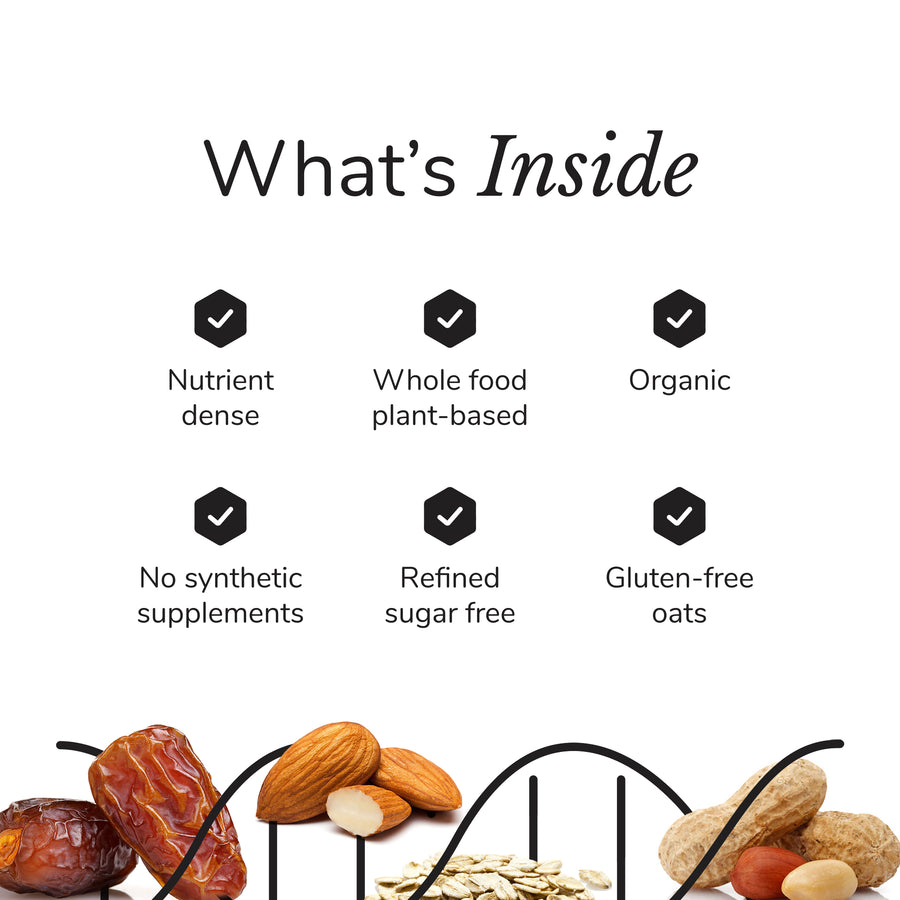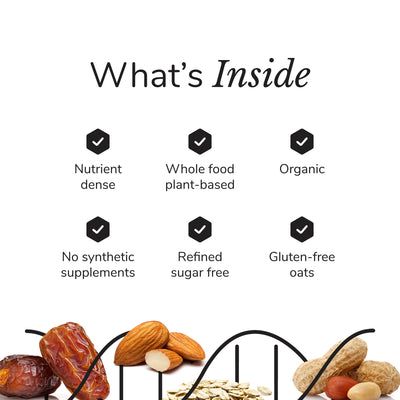The first 1000 days are a crucial period that lays the foundation for lifelong health. While much of the conversation around maternal milestones historically has focused on trimesters, we at Nunona believe that optimizing maternal nutrition starts with understanding the first 1000 days. We know that an infant’s long-term health starts at conception and is impacted by maternal nutrition, long before they take their first bite. Here we’ll break down what exactly is the first 1000 days, why it's so vital to nutritional programming, and how maternal nutrition plays a pivotal role in pregnancy, breastfeeding and babies development.
What are the first 1000 days?
The first 1000 days begin at conception and last through baby’s first two years of life1. During this time, the infant is solely reliant on the mom. Nearly 50% of the nutritional programming period happens before babies start eating solid foods.
This time is critical for a baby’s development. Nutrients from the mother’s food are the building blocks for the developing baby and allow all the biochemical reactions necessary for growth and development, including the rapid development of the brain2
Why are the first 1000 days of life critical?
During the first 1000 days, the nutrition environment changes genetic expression. This process is called nutritional programming or epigenetics. While the DNA is set at conception, how the genes are expressed is imprinted during this critical window3.
Because of the nutrient and energy demands of pregnancy and breastfeeding (as well as postpartum recovery), many women have difficulty meeting their needs in the modern food environment, and nutrient deficiencies are common4. Additionally, synthetic nutrients in fortified foods and supplements may have low bioavailability5. Pregnant women who supplement still have nutrient gaps5.
Nutritional programming
The Developmental Origins of Health and Disease explains the connections between in-utero and early life nutritional programming and health outcomes for infants, through childhood and into adulthood6.
For example, a diet high in processed carbohydrates but low in protein and plant foods can change programming that affects how the body metabolizes sugar and stores fat7. Both starvation and maternal overnutrition (too many calories without enough vitamins and minerals) contribute to disease risk7.
On the other hand, nutritional programming can have positive benefits. Optimizing maternal nutrition leads to programming patterns that promote healthy fetal development, childhood health, and wellness into adulthood3.
How to optimize maternal nutrition in the first 1000 days
Many women aren’t getting enough key nutrients during the first 1000 days because of issues like diet quality, soil depletion, and reliance on synthetic nutrients that may be poorly absorbed, which can affect health.
To help mothers and babies thrive during this critical window, Nunona is disrupting the prenatal nutrition market with Mama Bites, a real food pre+postnatal supplement. Mama Bites, a scientifically-backed formulation that uses only clean, organic and plant-based ingredients, are designed to provide essential micro- and macro-nutrients for nutritional programming and infant development.
Each daily Mama Bite serving includes a blend of 27 micronutrients such as organic kale, spinach and maitake mushroom to provide the specific nutrients mom and baby need to thrive during the first 1000 days. This completely non-synthetic, real-food supplement is also packed with nut butters, oats, sunflower seeds, flaxseeds and algae oil to help fill the maternal nutrition gaps, including nutrients required for brain health, during this programming window.
Nunona’s Mama Bites are the world’s most comprehensive prenatal supplement, made entirely from real food and can completely replace the synthetic prenatal pill most mothers take during pregnancy and beyond.
References
- Huang LT. Maternal and Early-Life Nutrition and Health. International Journal of Environmental Research and Public Health. 2020;17(21):7982. doi:https://doi.org/10.3390/ijerph17217982 Published 2020 Oct 30.
- Cheatham CL. Nutritional factors in fetal and infant brain development. Annals of Nutrition and Metabolism. 2019;75(Suppl. 1):20-32. doi:10.1159/000508052
- Moreno-Fernandez J, Ochoa JJ, Lopez-Frias M, Diaz-Castro J. Impact of Early Nutrition, Physical Activity and Sleep on the Fetal Programming of Disease in the Pregnancy: A Narrative Review. Nutrients. 2020;12(12):3900. doi:https://doi.org/10.3390/nu12123900. Published 2020 Dec 20.
- Mousa A, Naqash A, Lim S. Macronutrient and Micronutrient Intake during Pregnancy: An Overview of Recent Evidence. Nutrients. 2019;11(2):443. doi:https://doi.org/10.3390/nu11020443
- Bailey RL, Pac SG, Fulgoni VL, Reidy KC, Catalano PM. Estimation of Total Usual Dietary Intakes of Pregnant Women in the United States. JAMA Network Open. 2019;2(6):e195967. doi:https://doi.org/10.1001/jamanetworkopen.2019.5967. Published 2019 Jun 5.
- Hsu, Tain. The Good, the Bad, and the Ugly of Pregnancy Nutrients and Developmental Programming of Adult Disease. Nutrients. 2019;11(4):894. doi:https://doi.org/10.3390/nu11040894. Published 2019 Apr 20.
- Blasetti A, Alessia Quarta, Guarino M, et al. Role of Prenatal Nutrition in the Development of Insulin Resistance in Children. Nutrients. 2022;15(1):87-87. doi:https://doi.org/10.3390/nu15010087. Published 2022 Dec 24.
Mama Bites Pre+Postnatal Supplement
An award-winning pre+postnatal snackable supplement designed to nourish pregnancy, breastfeeding and postpartum while providing essential developmental nutrients for baby to create happy and healthy cells, for life..
1 box is 1-week supply (28 energy bites).
4 plant-based energy bites a day give you:
-
The extra 300 calories you need for pregnancy and breastfeeding
-
10% daily macronutrients to fuel pregnancy and postpartum
-
Complete plant-based prenatal with 27 food form organic nutrients for developing babies including:
-
200 mg Omega 3*, for babies brain development, sourced from non-gmo microalgae
-
26 mg Iron*, for babies brain and body development, sourced from organic spinach
-
575 mcg DFE Folate*, to support healthy cell growth, sourced from organic spinach
-
160 mg Choline*, for babies brain development, sourced from organic sunflower seeds
*Essential nutrients for pregnant and breastfeeding mamas to pass on to baby.
- Free Shipping, Over $75
- 30-Day Money Back Guarantee
- Easy Cancellation, Always















